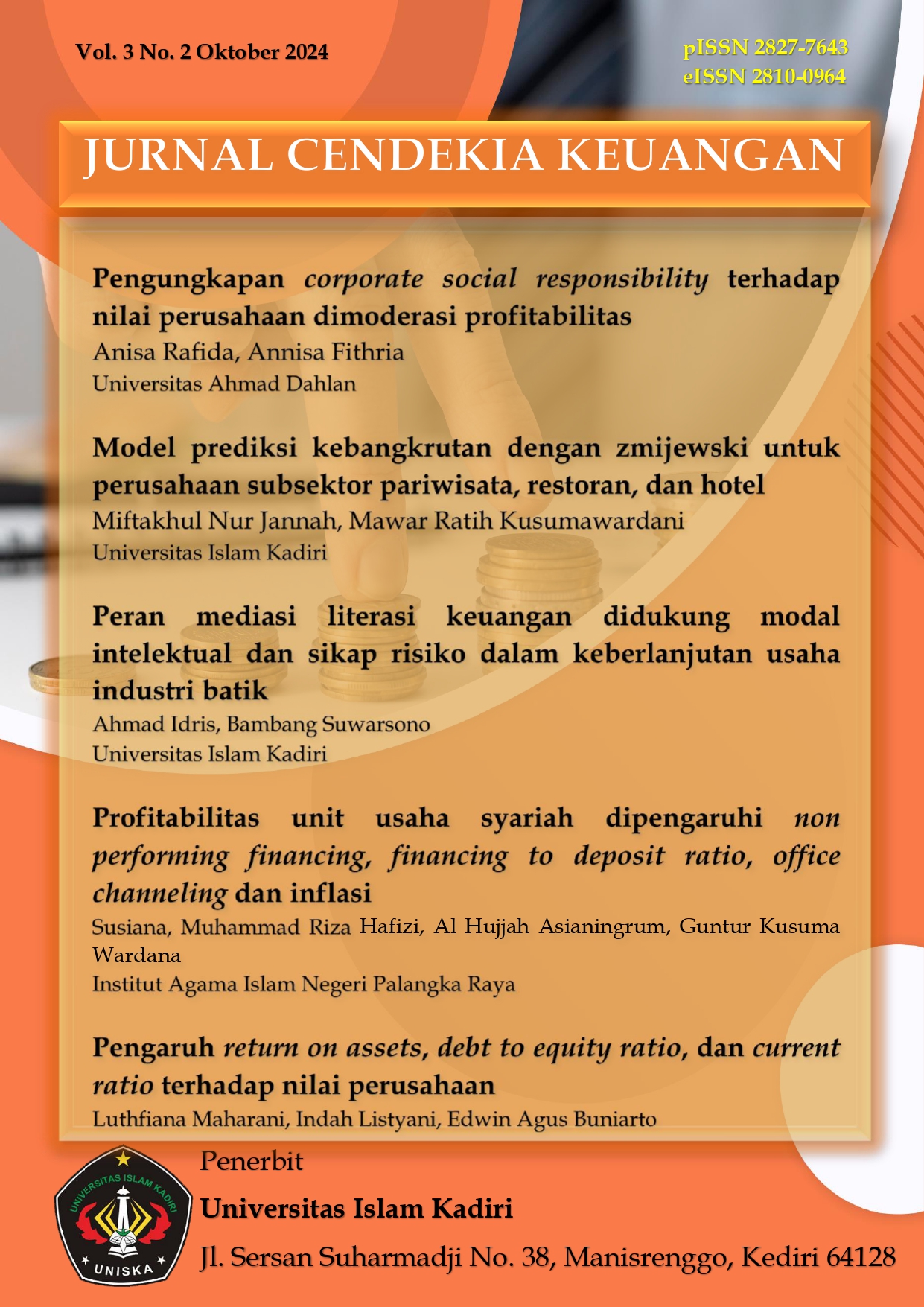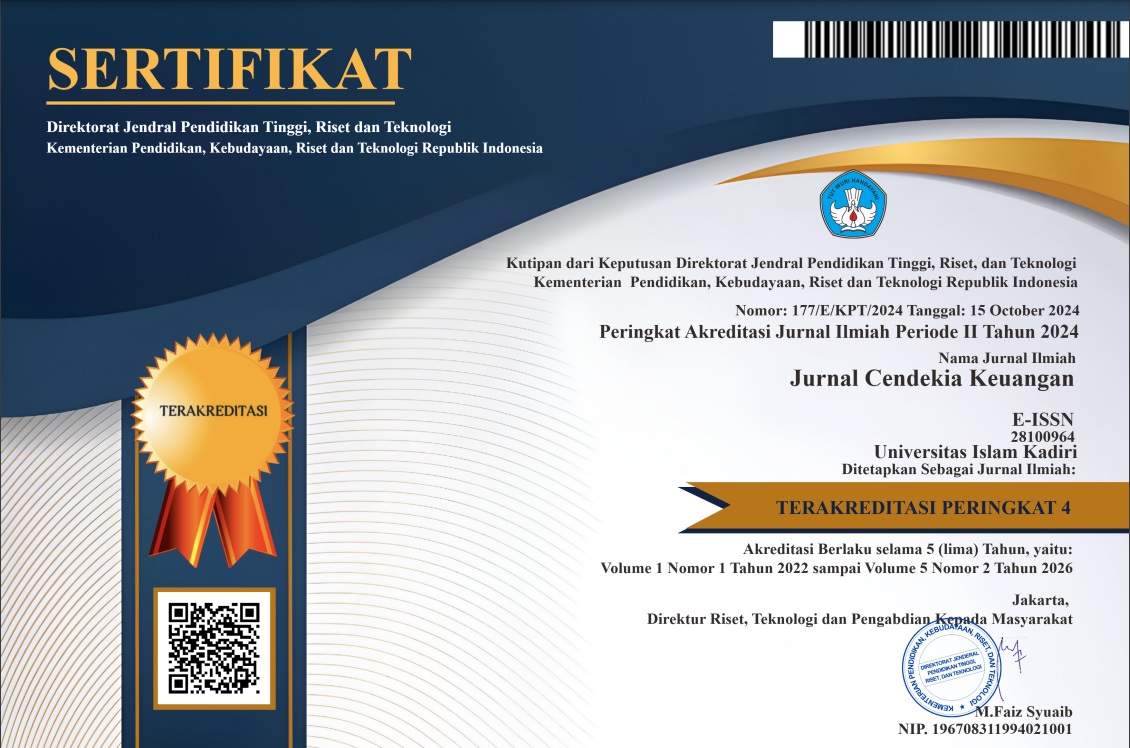Peran mediasi literasi keuangan didukung modal intelektual dan sikap risiko dalam keberlanjutan usaha industri batik
Abstract
Penelitian ini dilakukan untuk mengisi kesenjangan teoritis antara modal intelektual dan sikap risiko dan untuk mengidentifikasi perlunya studi lebih lanjut tentang peran mediasi literasi keuangan dan keberlanjutan bisnis pada UKM batik. Data dikumpulkan dengan menggunakan kuesioner yang diisi oleh 222 UKM batik di Jawa Timur. Teknik analisis data menggunakan structural equation modeling (SEM) dengan analysis of moment structure (AMOS). Hasil studi menunjukkan bahwa modal intelektual tidak berdampak pada keberlanjutan bisnis dan secara signifikan mempengaruhi literasi keuangan. Studi ini menunjukkan bahwa sikap risiko berpengaruh signifikan terhadap literasi keuangan dan keberlanjutan usaha. Literasi keuangan berpengaruh signifikan terhadap keberlanjutan bisnis. Temuan menarik dari penelitian ini adalah bahwa literasi keuangan memediasi modal intelektual dan sikap berisiko. Literasi keuangan juga menjadi mediator yang baik antara modal intelektual dan keberlanjutan bisnis. Literasi keuangan merupakan mediator yang baik antara sikap risiko dan keberlanjutan bisnis. Dengan demikian, temuan literasi keuangan sebagai faktor yang mempengaruhi keberlanjutan bisnis merupakan model penelitian yang signifikan berdasarkan teori dan fakta empiris di lapangan.
References
Affandi, Y., Ridhwan, M. M., Trinugroho, I., & Hermawan Adiwibowo, D. (2024). Digital adoption, business performance, and financial literacy in ultra-micro, micro, and small enterprises in Indonesia. Research in International Business and Finance, 70. https://doi.org/10.1016/j.ribaf.2024.102376
Agyapong, D. (2020). Analyzing financial risks in small and medium enterprises : evidence from the food processing firms in selected cities in Ghana. International Journal of Entrepreneurial Behavior & Research, 27(1), 45–77. https://doi.org/10.1108/IJEBR-05-2020-0269
Alharbi, R. K., Yahya, S., & Ramadani, V. (2022). Financial literacy, access to finance, SMEs performance and Islamic religiosity: evidence from Saudi Arabia. International Journal of Entrepreneurship and Small Business, 46(2), 259–285. https://doi.org/10.1504/IJESB.2022.124456
Aryani, S., Wiryono, S. K., Koesrindartoto, D. P., & Anggahegari, P. (2020). Global competition strategies for Indonesian SMEs. International Journal of Entrepreneurial Venturing, 12(4), 395–419. https://doi.org/10.1504/IJEV.2020.109592
Asravor, R. K. (2024). Factors influencing risk attitudes of entrepreneurs in Ghana: the role of gender. Journal of Small Business and Entrepreneurship, 36(1), 29–52. https://doi.org/10.1080/08276331.2021.1980838
Asyik, N. F., Wahidahwati, W., & Laily, N. (2022). The Role Of Intellectual Capital In Intervening Financial Behavior and Financial Literacy on Financial Inclusion. Wseas Transactions on Business and Economics, 19, 805–814. https://doi.org/10.37394/23207.2022.19.70
Beccacece, F. (2024). Multivariate risk attitude: a comparison of alternative approaches in sustainability policies. Decisions in Economics and Finance. https://doi.org/10.1007/s10203-024-00441-5
Buchdadi, A. D., Sholeha, A., Ahmad, G. N., & Mukson. (2020). The Influence Of Financial Literacy On SMEs Performance Through Access To Finance And Financial Risk Attitude As Mediation Variables. Academy of Accounting and Financial Studies Journal, 24(5), 1–16.
Cantonnet, M. L., Aldasoro, J. C., & Iradi, J. (2019). New and emerging risks management in small and medium-sized Spanish enterprises. Safety Science, 113(July 2018), 257–263. https://doi.org/10.1016/j.ssci.2018.11.032
Culebro-MartÃnez, R., Moreno-GarcÃa, E., & Hernández-MejÃa, S. (2024). Financial Literacy of Entrepreneurs and Companies’ Performance. Journal of Risk and Financial Management, 17(2). https://doi.org/10.3390/jrfm17020063
Dwimahendrawan, A., Sale, M., & Poernomo, D. (2020). Effect of company resources and capabilities to product innovation smes in East Java Batik. International Journal of Scientific and Technology Research, 9(1), 668–670. https://www.scopus.com/inward/record.uri?eid=2-s2.0-85078714513&partnerID=40&md5=a7862a2f4d4fc541408eb32cbd4a3725
Elkington, J. (1998). Partnerships from Cannibals with Forks: The Triple Bottom Line of 21st-Century Business. Environmental Quality Management, 8(1), 37–51.
Ganlin, P., Qamruzzaman, M. D., Mehta, A. M., Naqvi, F. N., & Karim, S. (2021). Innovative finance, technological adaptation and smes sustainability: The mediating role of government support during covid-19 pandemic. Sustainability (Switzerland), 13(16), 1–27. https://doi.org/10.3390/su13169218
Gao, F., Gao, J., Huang, N., & Wu, H. (2024). Selection of an economics-energy-environment scheduling strategy for a community virtual power plant considering decision-makers’ risk attitudes based on improved information gap decision theory. Energy, 299. https://doi.org/10.1016/j.energy.2024.131401
Garba, M. (2021). Intellectual Capital as a Panacea to Sustainability in Small and Medium-Scale Enterprises. Revista Gestão Inovação e Tecnologias, 11(3), 49–62. https://doi.org/10.47059/revistageintec.v11i3.1915
Garbie, I. H. (2014). An analytical technique to model and assess sustainable development index in manufacturing enterprises. International Journal of Production Research, 52(16), 4876–4915. https://doi.org/10.1080/00207543.2014.893066
Glowka, G., Kallmünzer, A., & Zehrer, A. (2021). Enterprise risk management in small and medium family enterprises: the role of family involvement and CEO tenure. International Entrepreneurship and Management Journal, 17(3), 1213–1231. https://doi.org/10.1007/s11365-020-00682-x
Gross-Gołacka, E., Kusterka-Jefmanska, M., & Jefmanski, B. (2020). Can elements of intellectual capital improve business sustainability?-The perspective of managers of smes in poland. Sustainability (Switzerland), 12(4), 1–23. https://doi.org/10.3390/su12041545
Hernita, H., Surya, B., Perwira, I., Abubakar, H., & Idris, M. (2021). Economic business sustainability and strengthening human resource capacity based on increasing the productivity of small and medium enterprises (SMES) in Makassar city, Indonesia. Sustainability (Switzerland), 13(6), 1–37. https://doi.org/10.3390/su13063177
Hillson, D., & Murray-Webster, R. (2007). Understanding and Managing Risk Attitude. In Routledge. Routledge.
Hj Talip, S. N. S., & Wasiuzzaman, S. (2024). Influence of human capital and social capital on MSME access to finance: assessing the mediating role of financial literacy. International Journal of Bank Marketing, 42(3), 458–485. https://doi.org/10.1108/IJBM-04-2023-0214
Hopkins, S., & O’Donovan, R. (2021). Using complex learning tasks to build procedural fluency and financial literacy for young people with intellectual disability. Mathematics Education Research Journal, 33(1), 163–181. https://doi.org/10.1007/s13394-019-00279-w
Huynh Mai Tram, N., & Hoang Ngoc, B. (2024). Environmental Foe or Friend: The Impact of Intellectual Capital and Ambidextrous Innovation on Environmental Performance. SAGE Open, 14(2). https://doi.org/10.1177/21582440241256768
Idris, A., Hanafi, M. M., Rahmawati, A., & Surwanti, A. (2023). IMPACT OF INTELLECTUAL CAPITAL AND RISK ATTITUDE THROUGH FINANCIAL LITERACY ON BUSINESS. 11(2), 113–136. https://doi.org/10.2478/eoik-2023-0052
Ilahiyah, M. E. (2019). The important role of intellectual capital for sme (Small medium enterprise). Opcion, 35(88), 793–818.
Jalali, A., Jaafar, M., & Ramayah, T. (2020). Organization-stakeholder relationship and performance of Iranian SMEs: Examining the separate mediating role of innovativeness and risk-taking. International Journal of Islamic and Middle Eastern Finance and Management, 13(3), 417–436. https://doi.org/10.1108/IMEFM-11-2018-0407
Jayashree, S., Hassan Reza, M. N., Malarvizhi, C. A. N., Maheswari, H., Hosseini, Z., & Kasim, A. (2021). The impact of technological innovation on industry 4.0 implementation and sustainability: An empirical study on malaysian small and medium sized enterprises. Sustainability (Switzerland), 13(18), 1–23. https://doi.org/10.3390/su131810115
Jayawinangun, R., Tosida, E. T., Nugraha, Y. A., Aunnie, D. P., Ardiansyah, D., Sambas, A., & Saputra, J. (2024). Investigating the communication network for batik village tourism stakeholders to support smart economy in Bogor regency, Indonesia. International Journal of Data and Network Science, 8(1), 381–392. https://doi.org/10.5267/j.ijdns.2023.9.016
Jebril, I., Al-Zaqeba, M. A. A., Al-Khawaja, H. A., Al Obaidy, A. L. A., & Marashdah, O. S. (2024). Enhancing estate governance using blockchain technology through risk management in estate governance of business sustainability. International Journal of Data and Network Science, 8(3), 1649–1658. https://doi.org/10.5267/j.ijdns.2024.3.002
Kaplan, R. S., & Norton, D. P. (1996). The balanced scorecard: translating strategy into action. In Harvard Business School Press, Boston, Massachusetts.
Kaplan, S., Schenkel, A., von Krogh, G., & Weber, C. (2001). Knowledge-based theories of the firm in strategic managment: A review and extension. Academy of Management Review, 617, 1–47.
Khalique, M., Bontis, N., Abdul Nassir bin Shaari, J., & Hassan Md. Isa, A. (2015). Intellectual capital in Pakistani small medum enterprises. Journal of Intellectual Capital, 16(1), 224–238.
Khan, N. U., Anwar, M., Li, S., & Khattak, M. S. (2021). Intellectual capital, financial resources, and green supply chain management as predictors of financial and environmental performance. Environmental Science and Pollution Research, 28(16), 19755–19767. https://doi.org/10.1007/s11356-020-12243-4
Kortana, T. (2019). The effectiveness of risk management and business performance: SMEs in Bangkok, Thailand. International Journal of Supply Chain Management, 8(5), 551–558.
Kostini, N., & Raharja, S. J. (2020). Analysis of Financial Behavior of SMEs in the Creative Industries in Bandung City, Indonesia. Review of Integrative Business and Economics Research, 9(1), 131–139. https://search.proquest.com/docview/2220699211?accountid=17242%0Ahttp://buscompress.com/riber-9-1.html
Kulathunga, K. M. M. C. B., Ye, J., Sharma, S., & Weerathunga, P. R. (2020). How does technological and financial literacy influence SME performance: Mediating role of ERM practices. Information (Switzerland), 11(6), 1–20. https://doi.org/10.3390/INFO11060297
Liu, B., Wang, J., Chan, K. C., & Fung, A. (2021). The impact of entrepreneurs’s financial literacy on innovation within small and medium-sized enterprises. International Small Business Journal: Researching Entrepreneurship, 39(3), 228–246. https://doi.org/10.1177/0266242620959073
Lynch, R., & McCullagh, O. (2024). Risk attitudes of tax practitioners and firm influence. Meditari Accountancy Research, 32(7), 86–108. https://doi.org/10.1108/MEDAR-06-2023-2050
Mabula, J. B., & Ping, H. D. (2018). Financial literacy of SME managers’ on access to finance and performance: The mediating role of financial service utilization. International Journal of Advanced Computer Science and Applications, 9(9), 32–41. https://doi.org/10.14569/ijacsa.2018.090905
Masdupi, E., Rasyid, R., & Darni, M. O. (2024). Financial literacy and sustainability in SMEs: Do financial risk attitude, access to finance, and organizational risk-taking tolerance mediate? Asian Economic and Financial Review, 14(1), 43–58. https://doi.org/10.55493/5002.v14i1.4959
Mehralian, G., Farzaneh, M., Yousefi, N., & Haloub, R. (2024). Driving new product development performance: Intellectual capital antecedents and the moderating role of innovation culture. Journal of Innovation and Knowledge, 9(3). https://doi.org/10.1016/j.jik.2024.100503
Miswanto, M., Tarigan, S. T., Wardhani, S., Khuan, H., Rahmadyanti, E., Jumintono, J., Ranatarisza, M. M., & Machmud, M. (2024). Investigating the influence of financial literacy and supply chain management on the financial performance and sustainability of SMEs. Uncertain Supply Chain Management, 12(1), 407–416. https://doi.org/10.5267/j.uscm.2023.9.011
Mittone, L., Morreale, A., & Vu, T.-T.-T. (2022). What drives innovative behavior?- An experimental analysis on risk attitudes, creativity and performance. Journal of Behavioral and Experimental Economics, 98(June 2022). https://doi.org/10.1016/j.socec.2022.101868
Naiwen, L., Wenju, Z., Mohsin, M., Ur Rehman, M. Z., Naseem, S., & Afzal, A. (2021). The role of financial literacy and risk tolerance: An analysis of gender differences in the textile sector of Pakistan. Industria Textila, 72(3), 300–308. https://doi.org/10.35530/IT.072.03.202023
Noctor, M., Stoney, S., & Stradling, R. (1992). Financial literacy: a discussion of concepts and competences of financial literacy and opportunities for its introduction into young people’s learning. National Foundation for Educational Research.
Noviyanti, D. (2024). The Influence of Financial Literacy and Financial Technology on SMEs’ Sustainability. In Lecture Notes on Data Engineering and Communications Technologies (Vol. 193, pp. 13–19). https://doi.org/10.1007/978-3-031-53555-0_2
Patma, T. S., Wardana, L. W., Wibowo, A., Narmaditya, B. S., & Akbarina, F. (2021). The impact of social media marketing for Indonesian SMEs sustainability: Lesson from Covid-19 pandemic. Cogent Business and Management, 8(1). https://doi.org/10.1080/23311975.2021.1953679
Potrich, A. C. G., Vieira, K. M., & Mendes-Da-Silva, W. (2016). Development of a financial literacy model for university students. Management Research Review, 39(3), 356–376. https://doi.org/10.1108/MRR-06-2014-0143
Pratono, A. H. (2018). Does firm performance increase with risk-taking behavior under information technological turbulence?: Empirical evidence from Indonesian SMEs. Journal of Risk Finance, 19(4), 361–378. https://doi.org/10.1108/JRF-10-2017-0170
Purba, M. I., Simanjutak, D. C. Y., Malau, Y. N., Sholihat, W., & Ahmadi, E. A. (2021). The effect of digital marketing and e-commerce on financial performance and business sustainability of MSMEs during COVID-19 pandemic in Indonesia. International Journal of Data and Network Science, 5(3), 275–282. https://doi.org/10.5267/j.ijdns.2021.6.006
Rahmadyanti, E., & Wiyono, A. (2020). Constructed Wetland with Rice Husk Substrate as Phytotechnology Treatment for Sustainable Batik Industry in Indonesia. Journal of Physics: Conference Series, 1569(4). https://doi.org/10.1088/1742-6596/1569/4/042018
Redha, T., Qubtan, A., Gan, P., Salwa, F., Hadi, A., Jalil, N. A., & Rambeli, N. (2021). Practical Risk Management Approaches among Small and Medium Enterprises. TEM Journal, 10(2), 996–1004. https://doi.org/10.18421/TEM102
Resmi, S., Pahlevi, R. W., & Sayekti, F. (2021). The Effect of Financial and Taxation Literation on Competitive Advantages and Business Performance: A Case Study in Indonesia. Journal of Asian Finance, Economics and Business, 8(2), 963–971. https://doi.org/10.13106/jafeb.2021.vol8.no2.0963
Sachdeva, G., Taneja, S., & Gupta, R. (2024). The mediating role of green human resource management: analyze the impact of green commitment and intellectual capital in hotel environmental performance. Energy Efficiency, 17(5). https://doi.org/10.1007/s12053-024-10229-6
Salangka, M. K., & Kameo, D. D. (2024). The effect of intellectual capital towards sustainability of business performance mediated by eco-product innovation & external learning: The Indonesian bottled drinking water industries. Uncertain Supply Chain Management, 12(1), 541–556. https://doi.org/10.5267/j.uscm.2023.8.017
Siddik, A. B., Rahman, M. N., & Yong, L. (2023). Do fintech adoption and financial literacy improve corporate sustainability performance? The mediating role of access to finance. Journal of Cleaner Production, 421. https://doi.org/10.1016/j.jclepro.2023.137658
Soewarno, N., Tjahjadi, B., & Permatanadia, D. (2020). Competitive Pressure and Business Performance in East Java Batik Industry. Journal of Asian Finance, Economics and Business, 7(12), 329–336. https://doi.org/10.13106/JAFEB.2020.VOL7.NO12.329
Sohilauw, M. ., & Nohong, M. (2020). The relationship between financial literacy, rational financing decision, and financial performance: An empirical study of small and medium enterprises in makassar. Jurnal Pengurusan, 59, 89–102. https://doi.org/10.17576/pengurusan-2020-59-09
Srikalimah, S., Wardana, L. W., Ambarwati, D., Sholihin, U., Shobirin, R. A., Fajariah, N., & Wibowo, A. (2020). Do Creativity and Intellectual Capital Matter for SMEs Sustainability? The Role of Competitive Advantage. Journal of Asian Finance, Economics and Business, 7(12), 397–408. https://doi.org/10.13106/JAFEB.2020.VOL7.NO12.397
Stewart, T. A. (1997). Intellectual capital: the new wealth of organizations, Bantam Doubleday Dell Publishing Group. Inc., New York, NY.
Styaningrum, F., Soetjipto, B. E., & Wulandari, D. (2020). The Determinants of SMEs’ Sustainability. Humanities & Social Sciences Reviews, 8(4), 422–430. https://doi.org/10.18510/hssr.2020.8441
Sudewi, N. N. D., & Dewi, S. K. S. (2022). The Effect of Financial Literacy and Intellectual Capital on Financial Performance. International Journal of Business Management and Economic Review, 5(4), 240–251. https://doi.org/http://doi.org/10.35409/IJBMER.2022.3425
Sullivan, P. H. (2000). Value-driven Intellectual Capital: How to Convert Intangible Corporate Assets into Market Value. John Wiley & Sons, Toronto.
Teowarang, J. R. (2024). Utilization of Pasuruan Regency Handloom Fabrication Silk for the Indonesian Sustainable Fashion Industry. Advances in Science, Technology and Innovation, 69–79. https://doi.org/10.1007/978-3-031-52726-5_8
Toni, N., & Theng, B. P. (2024). Investigating the effect of financial literacy and financial inclusion on operational and sustainable supply chain performance of SMEs. Uncertain Supply Chain Management, 12(1), 573–582. https://doi.org/10.5267/j.uscm.2023.8.014
Ullah, H., Wang, Z., Mohsin, M., Jiang, W., & Abbas, H. (2022). Multidimensional perspective of green financial innovation between green intellectual capital on sustainable business: the case of Pakistan. Environmental Science and Pollution Research, 29, 5552–5568. https://doi.org/10.1007/s11356-021-15919-7
Whajah, A., & Adenutsi, D. E. (2024). Financial Literacy and Performance of Small and Medium-ScaleEnterprises in Ghana: Exploring the Interplay of Financial Risk Attitude and Access to Finance. African Journal of Business and Economic Research, 19(1), 439–461. https://doi.org/10.31920/1750-4562/2024/v19n1a20
Ye, J., & Kulathunga, K. M. M. C. B. (2019). How does financial literacy promote sustainability in SMEs? A developing country perspective. Sustainability (Switzerland), 11(10), 1–21. https://doi.org/10.3390/su11102990
Ying, Q., Hassan, H., & Ahmad, H. (2019). The role of a manager’s intangible capabilities in resource acquisition and sustainable competitive performance. Sustainability (Switzerland), 11(2). https://doi.org/10.3390/su11020527
You, T., & You, Y. (2020). The Effect of Entrepreneurship on the Sustainability of Social Small and Medium Enterprises ( SMEs ) - Between the Mediating Effects of Government Support Policy in Korea. Research in World Economy, 11(2), 112–121. https://doi.org/10.5430/rwe.v11n2p112
Yusoff, Y. M., Omar, M. K., & Zaman, M. D. K. (2019). Do all elements of green intellectual capital contribute toward business sustainability ? Evidence from the Malaysian context using the Partial Least Squares method. Journal of Cleaner Production, 234, 626–637. https://doi.org/10.1016/j.jclepro.2019.06.153

This work is licensed under a Creative Commons Attribution-ShareAlike 4.0 International License.
















